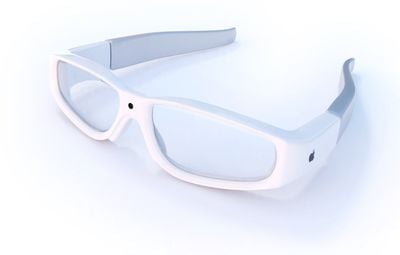New AR Sensor Coming to 2020 iPad Pro and iPhone Models, AR/VR Headset as Soon as 2021
Following a report from The Information this morning summarizing a recent internal Apple meeting that pegged the release of Apple's augmented reality headsets for the 2022–23 timeframe rather than the more aggressive 2020 window that has previously been rumored, Bloomberg's Mark Gurman has shared additional information on the company's AR roadmap that will initially focus on the iPad and iPhone before the glasses come to fruition.

"Apple Glasses" concept
Gurman says Apple is working on "a range of augmented and virtual-reality devices" based around a new 3D sensor system, which will arrive first on a new
iPad Pro slated for release in the first half of next year, and followed by the 2020 iPhones later in the year.
A new iPad Pro for release as early as the first half of 2020 will feature a new module with two camera sensors, up from one on the current model, and a small hole for the 3-D system, letting people create three-dimensional reconstructions of rooms, objects and people. The Cupertino, California-based technology giant also plans to add the sensor to new high-end iPhones later in 2020, along with 5G networking capabilities, said the people, who asked not to be identified discussing unannounced products.
Moving beyond existing devices, Apple is said to be targeting 2021 or 2022 for the release of a combination VR and AR headset focused on "gaming, watching video and virtual meetings." A lighter weight set of AR glasses could follow as soon as 2023.
The 3D sensor system to be used in the upcoming is said to be a more advanced version of the current Face ID sensor, and Apple's engineering teams are working on creating linkages to the new "rOS" operating system for these headsets that will let them work with existing iOS devices.
For more on Apple's AR/VR project, check out the full report over at bloomberg.com.
Popular Stories
Apple's next-generation iPhone 17 Pro and iPhone 17 Pro Max are less than three months away, and there are plenty of rumors about the devices.
Apple is expected to launch the iPhone 17, iPhone 17 Air, iPhone 17 Pro, and iPhone 17 Pro Max in September this year.
Below, we recap key changes rumored for the iPhone 17 Pro models:Aluminum frame: iPhone 17 Pro models are rumored to have an...
Apple is developing a MacBook with the A18 Pro chip, according to findings in backend code uncovered by MacRumors.
Earlier today, Apple analyst Ming-Chi Kuo reported that Apple is planning to launch a low-cost MacBook powered by an iPhone chip. The machine is expected to feature a 13-inch display, the A18 Pro chip, and color options that include silver, blue, pink, and yellow.
MacRumors...
In 2020, Apple added a digital car key feature to its Wallet app, allowing users to lock, unlock, and start a compatible vehicle with an iPhone or Apple Watch. The feature is currently offered by select automakers, including Audi, BMW, Hyundai, Kia, Genesis, Mercedes-Benz, Volvo, and a handful of others, and it is set to expand further.
During its WWDC 2025 keynote, Apple said that 13...
Apple hasn't updated the AirPods Pro since 2022, and the earbuds are due for a refresh. We're counting on a new model this year, and we've seen several hints of new AirPods tucked away in Apple's code. Rumors suggest that Apple has some exciting new features planned that will make it worthwhile to upgrade to the latest model.
Subscribe to the MacRumors YouTube channel for more videos.
Heal...
Apple is planning to launch a low-cost MacBook powered by an iPhone chip, according to Apple analyst Ming-Chi Kuo.
In an article published on X, Kuo explained that the device will feature a 13-inch display and the A18 Pro chip, making it the first Mac powered by an iPhone chip. The A18 Pro chip debuted in the iPhone 16 Pro last year. To date, all Apple silicon Macs have contained M-series...
Popular accessory maker Anker this month launched two separate recalls for its power banks, some of which may be a fire risk.
The first recall affects Anker PowerCore 10000 Power Banks sold between June 1, 2016 and December 31, 2022 in the United States. Anker says that these power banks have a "potential issue" with the battery inside, which can lead to overheating, melting of plastic...
Chase this week announced a series of new perks for its premium Sapphire Reserve credit card, and one of them is for a pair of Apple services.
Specifically, the credit card now offers complimentary annual subscriptions to Apple TV+ and Apple Music, a value of up to $250 per year.
If you are already paying for Apple TV+ and/or Apple Music directly through Apple, those subscriptions will...
As part of its 10-year celebrations of Apple Music, Apple today released an all-new personalized playlist that collates your entire listening history.
The playlist, called "Replay All Time," expands on Apple Music's existing Replay features. Previously, users could only see their top songs for each individual calendar year that they've been subscribed to Apple Music, but now, Replay All...






















